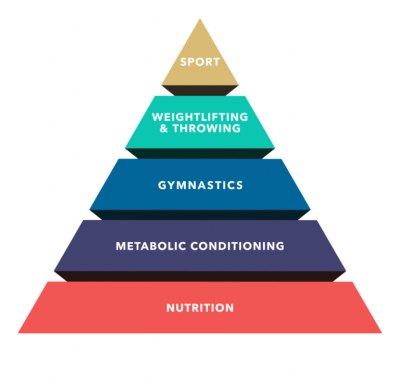
We’re going to shift directions here and head into the kitchen, so to speak. One of the key things that we talk to people about, both members and people thinking of joining, is nutrition. That’s why it’s at the base of the pyramid above.
This may come as a surprise to some, but in the health and fitness realm, what you put into your mouth is arguably more important than the exercise that you do.
Have you heard any of these before?
“You can’t out-work a bad diet.”
“80 percent of your body composition is due to your nutrition. The other 20 percent is due to genetics and physical activity.”
“Abs are made in the kitchen.”
We’re not saying everyone needs (or even wants) visible abs, but the point is that food is important – both quantity and quality.
What we eat, how we eat, and how we think about food — if we were describing it as a relationship, we’d say, “It’s complicated.” It IS complicated. What we eat is determined by our location, finances, heritage, local and family customs, living situation, schedule, taste preferences, etc.
Our approach to nutrition is pretty straightforward. We want our members to have a basic understanding of:
1. Macronutrients (proteins, fats, carbohydrates) and what they do.
2. What constitutes a serving size for each macronutrient.
3. What a balanced meal looks like.
4. How to choose foods based on their goals.
Notice that we’re not pushing supplements, and we don’t dictate precise meals to eat. We want you to have the tools to make your own decisions, as that’s the most effective approach for sustainable progress.
Buying into supplement programs and highly structured meal plans might work in the short term, but… they ultimately come up short in the long term because:
a) you run out of money for the magic supplements (pro tip… it’s actually the caloric restriction getting you the results, not the supplements),
or b) as with any overly restrictive plan, you’re going to fall off the wagon eventually.
Effective nutrition is about having some basic knowledge, having a plan, and building good habits. Why habits and not willpower? Because we’re all creatures of habit. Make it easy for your plan to succeed. Willpower means that you’re constantly testing your resolve. Once they are in place, habits take the thought out of the equation.
The good news is this. Nutrition is something you have control over. You might not always have time to train 3+ times a week, but you can make choices about what you eat.
As with your physical training, being in a group of like-minded humans and having a coach to guide you, gives accountability and support for your nutrition also.
Want to be part of a group of people all aiming for similar goals? Click on that red Membership Pricing button, and we’ll follow up with you.
